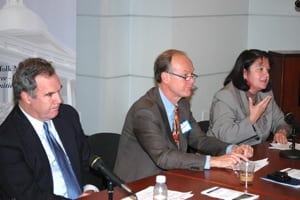Who is a member?
Our members are the local governments of Massachusetts and their elected and appointed leadership.
 Speaking at a forum in Boston yesterday, three longtime municipal managers emphasized the value of innovative practices in an era of tight budgets.
Speaking at a forum in Boston yesterday, three longtime municipal managers emphasized the value of innovative practices in an era of tight budgets.
The forum, hosted by Suffolk University’s Center for Innovation and Change Leadership in collaboration with the MMA, featured Danvers Town Manager Wayne Marquis, Sudbury Town Manager Maureen Valente, and Lowell City Manager Bernard Lynch. In addition to discussing new programs they have helped to implement, the three managers emphasized the importance of embracing change.
“If you don’t have a culture that encourages trying new ideas, if you don’t encourage innovation and entrepreneurship, you will have a real problem trying to do more with less,” Marquis said.
Valente added, however, that it often makes sense to wait until another city or town has pioneered an idea and worked through its challenges.
“When possible, learn from others,” Valente said. “Really pay attention and learn from those who are out there innovating.
“I’m glad to be the first person in the second group to implement a new and innovative program,” she said. “We don’t want to jump on unproven models. … We want evidence that the innovation is sustainable.”
Valente also cited the importance of having the support of the community’s elected officials.
“Staff can get attacked for proposing something,” Valente said. “Decisions should be by consensus.”
She described Sudbury’s approach as one of “cautious, careful innovation.” Key features, embodied in the acronym C.O.R.E, include consolidation, cooperation, regionalism and enterprise funding.
Sudbury uses enterprise funding for maintenance of the town’s ball fields. The fields were in good condition, Valente said, but town officials told parents that the municipal budget couldn’t maintain fields at the level that parents and athletes expected unless a user fee was introduced. Parents agreed, and the enterprise fund now accounts for the equivalent of more than one-half of the salary and benefits of a public works position.
In Lowell, according to Lynch, the performance benchmarking program known as CitiStat has helped identify ways to save money. Among the steps the city has taken recently is the creation of a Division of Development Services. The division, described as a one-stop center for permitting and code enforcement, has saved Lowell about $300,000 in personnel costs while boosting revenue by $100,000, Lynch said.
The city also uses performance contracting as a way to save on energy costs, and contracts out cemetery maintenance, a move that Lynch said is expected to save close to $1 million next year.
Danvers this year established a summer program for the children of roughly 150 homeless families placed in motels on Route 1. The town raised more than $30,000 in donations and in just three weeks was able to set up a recreational program that provided more than 200 children with meals and activities for the rest of the summer.
“By all accounts, it was a success not only for the families, but the staff,” Marquis said.
Several years ago, when midyear local aid cuts forced Danvers to terminate its contract with the provider of after-school activities, the town had to hire more staff to run an after-school program of its own. Due to creative thinking, however, Marquis said the town’s Recreation Department ended up generating $50,000 in new net revenue, helping the town balance its budget.
In Sudbury, the town library is making use of radio frequency identification, or RFID, an electronic-tagging system that is widely used for tracking inventory. The technology, according to Valente, enables library patrons to check out books themselves, freeing up librarians for other tasks.